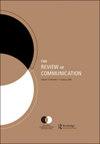Unveiling Our Scars: artist statement
Q3 Social Sciences
引用次数: 3
Abstract
ABSTRACT Narrated through a layered account, Unveiling Our Scars weaves back and forth between reflections about the past and present, exploring Black masculine identity through the lens of intimate relationships. Situating my lived experiences within broader conversations about Black masculinity and cultural stereotypes, this narrative short film autoethnographically analyzes how my performance of self, within the context of intimate relationships, supports and challenges the canonical and contemporary hegemonic scripting of Black men as bodies that lack the capability to be emotionally vulnerable and possess a limited range of emotions. Undergirded by a Black masculine theoretical framework, this film complicates the narrow scripting of Black masculine performance and advocates for what communication scholar and Black masculine theorist Ronald L. Jackson II describes as the adoption of a model of Black masculinity that embraces a spectrum of performative possibilities.揭开我们的伤疤:艺术家宣言
摘要《揭开我们的伤疤》通过分层叙述,在对过去和现在的思考之间来回穿梭,通过亲密关系的镜头探索黑人的男性身份。这部叙事短片将我的生活经历置于关于黑人男子气概和文化刻板印象的更广泛对话中,自动地分析了我在亲密关系背景下的自我表现,支持并挑战了将黑人男性描述为缺乏情感脆弱能力和情感范围有限的身体的规范和当代霸权。在黑人男性理论框架的指导下,这部电影使黑人男性表演的狭隘脚本变得复杂,并倡导传播学者和黑人男性理论家罗纳德·L·杰克逊二世所描述的采用黑人男性气质模式,这种模式包含了一系列表演可能性。
本文章由计算机程序翻译,如有差异,请以英文原文为准。
求助全文
约1分钟内获得全文
求助全文

 求助内容:
求助内容: 应助结果提醒方式:
应助结果提醒方式:


